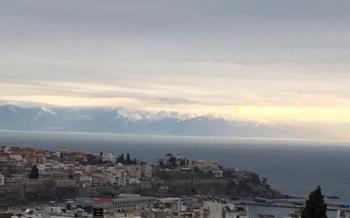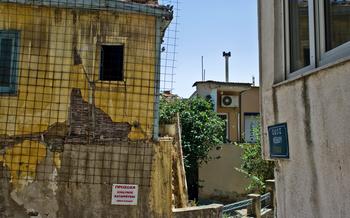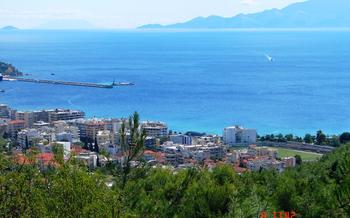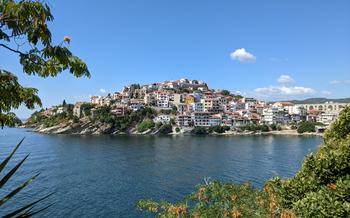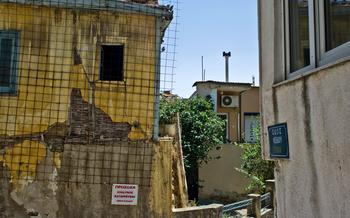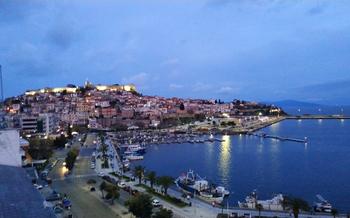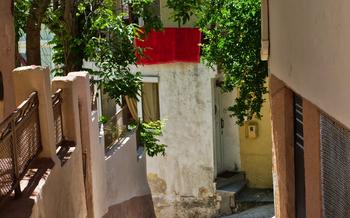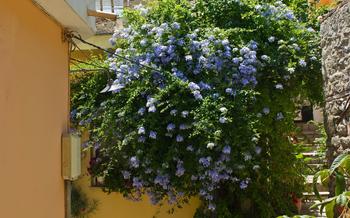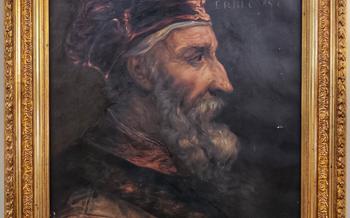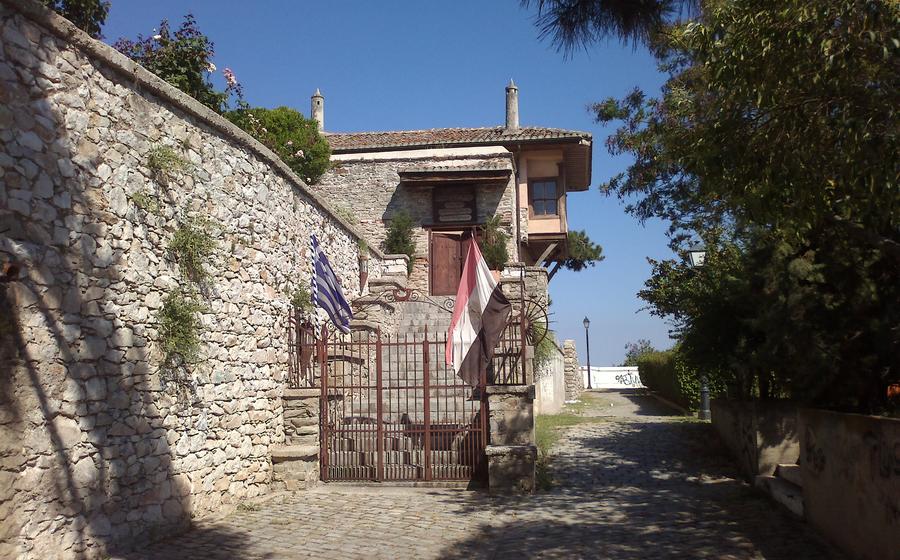
The House of Mehmet Ali
- The House of Mehmet Ali: An Overview
- Exploring the Museum
- Mehmet Ali's Legacy: A Bridge between Egypt and Greece
- Architectural Highlights:
- Cultural Significance
- Historical Context
- Guided Tours and Educational Programs
- The Gardens of the House: A Serene Oasis
- Special Events and Exhibitions
- Restoration and Preservation Efforts
- Accessibility for Visitors
- Local Culture and Cuisine
- Nearby Attractions
- The House in Literature and Art:
- Insider Tip:
The House of Mehmet Ali: An Overview
The House of Mehmet Ali, also known as the House of Kavala, is a magnificent historic building situated in the heart of the picturesque city of Kavala, Greece. This architectural treasure holds immense historical significance and cultural importance as the former residence of Mehmet Ali, the founder of modern Egypt. Built in the early 19th century, the house stands as a testament to the remarkable life and legacy of this influential figure.
Conveniently located in the city center, the House of Mehmet Ali is easily accessible to visitors. Its prominent position on Eleftheriou Venizelou Street, a vibrant pedestrianized thoroughfare, makes it a popular destination for tourists and locals alike.
The house's architectural design showcases a harmonious blend of Ottoman and Egyptian influences, reflecting Mehmet Ali's dual heritage. Its elegant facade features intricate carvings, decorative motifs, and colorful tiles, showcasing the artistry and craftsmanship of the period. The building's distinctive style and grandeur set it apart from the surrounding structures, making it a captivating sight for visitors.
Throughout its history, the House of Mehmet Ali has served various purposes. Initially constructed as a private residence for Mehmet Ali, it later became the headquarters of the Egyptian consulate in Kavala. Subsequently, it housed the Egyptian Archaeological Society and served as a cultural center promoting Egyptian-Greek relations. Today, the building has been transformed into a museum dedicated to preserving and showcasing the life and legacy of Mehmet Ali.
Exploring the Museum
The House of Mehmet Ali is not just a historical landmark but also a treasure trove of knowledge and artifacts that bring the life and legacy of Mehmet Ali to life. The museum within the house showcases a diverse collection of exhibits and interactives that provide visitors with a deeper understanding of this remarkable figure.
Among the highlights of the museum are the personal belongings of Mehmet Ali, including his clothing, weapons, and jewelry. These items offer a glimpse into his personal life and preferences, revealing aspects of his character that might not be evident from his public persona.
Interactive displays and multimedia presentations bring Mehmet Ali's story to life, allowing visitors to engage with his achievements and contributions in a dynamic way. These displays employ touchscreens, videos, and sound effects to create an immersive experience that makes history come alive.
Guided tours are available for visitors who wish to gain a deeper understanding of the exhibits and the historical context of Mehmet Ali's life. Knowledgeable guides share insights and anecdotes about Mehmet Ali, providing visitors with a more comprehensive perspective on his legacy.
The museum also organizes thematic events and workshops throughout the year, offering visitors an opportunity to engage with the house and its history in new and exciting ways. These events might include lectures by historians, traditional Egyptian music performances, or hands-on workshops related to Mehmet Ali's era.
Mehmet Ali's Legacy: A Bridge between Egypt and Greece
Mehmet Ali's life and accomplishments left an indelible mark on the history of Egypt, Greece, and the broader Mediterranean region. Born to a humble Albanian family in Kavala, he rose through the ranks of the Ottoman military to become the founder and first ruler of the Muhammad Ali dynasty in Egypt. His reign marked a period of modernization and development in Egypt, as he introduced reforms in agriculture, education, and the military. He established a strong military that played a crucial role in defending Egypt's sovereignty and expanding its influence in the region.
Mehmet Ali's relationship with Greece was complex and multifaceted. While he was a staunch supporter of the Ottoman Empire, he also recognized the aspirations of the Greek people for independence. He maintained diplomatic relations with Greece and provided support to the Greek War of Independence, albeit indirectly. His policies towards Greece were influenced by a combination of geopolitical considerations, his personal ties to the region, and his desire to maintain stability in the eastern Mediterranean.
Mehmet Ali's legacy extends beyond his political and military achievements. He is remembered as a visionary leader who laid the foundation for modern Egypt and contributed to the cultural and economic development of the region. His impact on the history of both Greece and Egypt is still felt today, making him a significant figure in the annals of the Mediterranean world.
Architectural Highlights:
The House of Mehmet Ali stands as a testament to the fusion of Ottoman and Egyptian architectural traditions. Its distinctive façade is adorned with intricate carvings and decorative motifs, showcasing the craftsmanship and artistry of the era. The vibrant tiles and colorful patterns add a touch of exuberance, reflecting the vibrant spirit of Egypt.
The house's architectural style is a blend of Islamic and European influences, evident in the pointed arches, domed roofs, and ornate balconies. The fusion of these elements creates a unique and harmonious design that captivates visitors with its visual appeal.
Each architectural element holds a symbolic meaning, representing the power and grandeur of the Muhammad Ali dynasty. The intricate carvings tell stories of bravery, love, and conquest, while the colorful tiles symbolize prosperity and abundance. The house's architecture is not merely a visual delight but also a testament to the rich cultural heritage of the region.
Cultural Significance
The House of Mehmet Ali stands as a symbol of cultural exchange between Greece and Egypt, a testament to the rich history and shared heritage of these two nations. Its existence serves as a reminder of the deep connections that have existed between the Mediterranean region's diverse cultures for centuries. The house has played a pivotal role in preserving and promoting the heritage of both countries, offering a tangible link to the past and fostering understanding between the two cultures.
Mehmet Ali's legacy has left an indelible mark on Greek culture and society, influencing everything from architecture to cuisine. The house, as a symbol of his contributions, serves as a source of pride for both Egyptians and Greeks, representing the enduring bonds between their nations.
Recognizing the cultural significance of the house, there have been ongoing efforts to protect and restore its heritage. Both the Greek and Egyptian governments, along with international organizations, have collaborated to ensure its preservation for future generations. Through these efforts, the house continues to serve as a symbol of cultural exchange and understanding, inspiring visitors to appreciate the rich tapestry of the Mediterranean's diverse heritage.
Historical Context
The House of Mehmet Ali stands as a testament to the complex geopolitical climate of the 19th century, a time marked by the rise of nationalism and the struggle for independence in Greece. The Ottoman Empire, a dominant force in the region, played a significant role in shaping the historical context of the house.
During this era, Greece was under Ottoman rule, and the Greek people yearned for freedom and self-governance. The Greek War of Independence, which erupted in 1821, was a pivotal moment in the country's history, and Mehmet Ali, the ambitious ruler of Egypt, played a controversial role in the conflict.
Initially, Mehmet Ali supported the Ottoman Empire in its efforts to suppress the Greek rebellion. However, as the war progressed, he shifted his allegiance and provided assistance to the Greek forces. His motivations were complex, influenced by a combination of political opportunism, personal ambition, and a desire to expand his own power in the region.
Mehmet Ali's involvement in the Greek War of Independence highlights the intricate web of alliances and rivalries that characterized the era. His actions were met with mixed reactions from both the Ottoman Empire and the Greek people, demonstrating the complexities of the historical context in which the House of Mehmet Ali was built.
Guided Tours and Educational Programs
The House of Mehmet Ali offers guided tours in various languages, providing visitors with an in-depth understanding of its history and significance. Trained guides lead the tours, sharing insights into the life of Mehmet Ali, the architectural features of the house, and its role in the cultural exchange between Greece and Egypt. The tours are designed to be informative and engaging, allowing visitors to connect with the past and gain a deeper appreciation for the house's legacy.
In addition to guided tours, the house also offers educational programs and workshops for students and groups. These programs focus on various aspects of Mehmet Ali's life and the history of the house, using interactive displays, hands-on activities, and multimedia presentations. The programs are designed to be educational and engaging, providing participants with a comprehensive understanding of the house's significance and its impact on the region.
The Gardens of the House: A Serene Oasis
Amidst the bustling city of Kavala, the House of Mehmet Ali boasts a hidden gem – its beautifully landscaped gardens. Step through the gates and be transported to a tranquil oasis, where nature and history intertwine.
The gardens, meticulously designed in the 19th century, are a testament to the passion and vision of Mehmet Ali and his family. Stroll along the winding paths, surrounded by lush greenery, vibrant flowers, and the gentle sound of water features.
The variety of plants and flowers is a testament to the rich biodiversity of the Mediterranean region. Exotic species from Egypt and beyond harmoniously coexist with native Greek flora, creating a colorful tapestry of colors and scents.
Intricate sculptures and water features add a touch of whimsy and elegance to the gardens. Water cascades from fountains, creating a soothing melody that echoes through the air. Statues of mythical creatures and historical figures adorn the landscape, inviting visitors to explore the stories they hold.
Take a moment to relax in the shade of a century-old tree, breathe in the fresh air, and let the serene atmosphere envelop you. The gardens of the House of Mehmet Ali offer a sanctuary for contemplation, reflection, and appreciation of the beauty of nature.
Special Events and Exhibitions
The House of Mehmet Ali is not just a museum frozen in time but also a vibrant cultural hub that hosts a variety of temporary exhibitions and events throughout the year. These events aim to showcase local and international talent, celebrate Greek and Egyptian traditions, and offer visitors a dynamic and immersive experience.
Art exhibitions featuring contemporary and historical works by local and international artists are regularly held in the house's galleries. These exhibitions provide a platform for emerging artists to showcase their work and for visitors to discover new artistic perspectives.
The house also hosts concerts and musical performances featuring traditional and contemporary musicians from Greece and Egypt. These events create a unique atmosphere where visitors can enjoy the fusion of different musical traditions and experience the vibrant cultural heritage of both countries.
Seasonal festivals and celebrations are another highlight of the house's event calendar. These events showcase traditional Greek and Egyptian customs, such as dance performances, folk music concerts, and culinary demonstrations. Visitors can immerse themselves in the rich cultural traditions of both nations and experience the warmth and hospitality of the local community.
Special lectures and workshops are also organized at the house, inviting experts, historians, and artists to share their knowledge and insights on various topics related to the house's history, architecture, and cultural significance. These events provide an opportunity for visitors to engage in thought-provoking discussions and gain a deeper understanding of the house and its legacy.
By hosting these special events and exhibitions, the House of Mehmet Ali transforms into a dynamic cultural space that celebrates the rich heritage of Greece and Egypt while fostering intercultural dialogue and understanding among visitors from around the world.
Restoration and Preservation Efforts
The House of Mehmet Ali has undergone several restoration projects over the years to preserve its historical integrity and architectural beauty. The challenges of preserving a historic building in a modern context are significant, as balancing authenticity with functionality and safety is crucial. The ongoing restoration work aims to maintain the original character and features of the house while adapting it to modern standards and accessibility needs.
The local community and international organizations play a vital role in supporting preservation efforts. Partnerships with cultural institutions, heritage organizations, and government agencies provide resources, expertise, and funding for restoration projects. The dedication and collaboration of these stakeholders ensure that the house remains a testament to the rich history of Kavala and the legacy of Mehmet Ali.
Preserving cultural heritage is essential for future generations. The House of Mehmet Ali serves as a tangible link to the past, allowing visitors to experience the grandeur and significance of this historic era. By safeguarding its architectural integrity and cultural value, the house contributes to the preservation of Greece's and Egypt's shared heritage and ensures its continued relevance as a symbol of intercultural exchange and understanding.
Accessibility for Visitors
Planning Your Visit:
The House of Mehmet Ali is open to the public, and its doors welcome visitors eager to delve into its historical significance. Plan your visit during its customary opening hours, which typically fall between 9:00 AM and 5:00 PM, and ensure you set aside ample time to soak in the richness of the exhibits. The admission fee is reasonable, allowing for an accessible and enriching experience for all.
Navigating the House:
Upon arrival, visitors are greeted by helpful staff who can provide guidance and answer any questions. The house's layout is designed with accessibility in mind, featuring ramps and elevators to facilitate seamless movement throughout its various levels.
Additional Facilities:
The House of Mehmet Ali boasts thoughtful facilities to enhance the visitor experience. Restrooms are conveniently located within the premises, ensuring comfort and convenience. Additionally, a charming gift shop offers a range of souvenirs and educational materials, enabling visitors to take home a piece of their Kavalian journey.
Insider Tip:
Explore the house at your own pace with the assistance of an audio guide. This self-guided tour offers a comprehensive narrative of Mehmet Ali's life and legacy, allowing you to delve deeper into the captivating history that unfolds within these walls.
Local Culture and Cuisine
Kavala's vibrant local culture is a blend of Greek traditions and influences from its diverse history. Visitors can immerse themselves in the city's lively atmosphere by exploring its charming streets, bustling markets, and traditional tavernas.
Traditional Greek cuisine is a highlight of any visit to Kavala. The city offers a variety of restaurants and cafes where visitors can sample delicious dishes such as fresh seafood, grilled meats, and traditional pastries. Local specialties include Kavala's famous koulouri, a type of sesame-crusted bread, and its unique take on baklava, made with layers of phyllo pastry, nuts, and honey.
To fully experience the local culinary scene, visitors can explore the city's central market, where they can find fresh produce, spices, and traditional Greek delicacies. The market is a great place to interact with locals and learn about the region's culinary traditions.
For a memorable dining experience, visitors can head to one of the many tavernas in the old town, where they can enjoy traditional Greek dishes in a charming and authentic setting. Many tavernas offer live music and dancing, providing a lively and immersive atmosphere.
Nearby Attractions
Kavala offers a wealth of historical and natural attractions beyond the House of Mehmet Ali. The city's Old Town, with its cobbled streets, traditional architecture, and charming cafes, is a must-visit for history buffs. The Imaret, a former Ottoman soup kitchen, now houses a museum dedicated to the city's Islamic heritage. The Archaeological Museum of Kavala showcases artifacts from the region's ancient past, including the nearby Neapolis ruins.
Nature lovers can explore the scenic Kalamitsa Beach, just a short walk from the city center. The beach offers stunning views of the Aegean Sea and the surrounding mountains. For a more adventurous experience, visitors can hike to the top of Mount Pangeon, the highest peak in the region, and enjoy panoramic views of the countryside.
Day trips from Kavala offer even more exploration opportunities. The island of Thasos, with its pristine beaches, lush forests, and ancient ruins, is a popular destination. The traditional villages of the mainland, such as Panagia and Keramoti, offer a glimpse into rural Greek life and cuisine. For a unique experience, visitors can take a boat tour to the nearby Ammouliani Island, known for its crystal-clear waters and secluded coves.
Whether you're interested in history, nature, or culture, Kavala and its surroundings have something to offer every traveler. By combining a visit to the House of Mehmet Ali with these nearby attractions, you can create a comprehensive and unforgettable itinerary that showcases the diverse wonders of this charming Greek city.
The House in Literature and Art:
The House of Mehmet Ali has captured the imagination of creative minds, inspiring numerous works of literature, art, and film. Its unique history and architectural beauty have served as a backdrop for novels, paintings, and movies that explore themes of cultural exchange, identity, and the enduring legacy of the past.
One notable literary work that features the house is the novel "The Pasha's House" by Eleni Sikelianos. The book tells the story of a young Greek woman who falls in love with a Turkish man during the tumultuous years of the Greek War of Independence. The house serves as a symbol of the complex relationship between the two cultures, as well as the personal and political struggles of the characters.
In the realm of art, the house has been immortalized in the paintings of renowned Greek artist Yannis Tsarouchis. His vibrant and evocative works capture the essence of the building, its architectural details, and the surrounding landscape. Tsarouchis' paintings offer a unique perspective on the house, allowing viewers to experience its beauty and significance through the eyes of a master artist.
The house has also made its way onto the silver screen, appearing in several films that explore its historical and cultural significance. One notable example is the Greek film "The House of Mehmet Ali" directed by Tassos Boulmetis. The movie tells the story of a young Egyptian architect who travels to Greece to restore the house and learn about its history. Through his journey, the film delves into the complex relationship between Greece and Egypt, as well as the enduring legacy of Mehmet Ali.
These artistic representations of the House of Mehmet Ali highlight its cultural significance and provide visitors with new and engaging ways to experience its history and beauty. Whether through literature, art, or film, the house continues to inspire and captivate audiences around the world.
Insider Tip:
For a unique perspective on the house, climb to the rooftop terrace. Here, you'll be rewarded with panoramic views of Kavala, the harbor, and the surrounding countryside. This hidden gem offers a breathtaking perspective, allowing you to appreciate the house's architectural details and its harmonious integration with the cityscape. Capture the stunning vistas with your camera or simply soak in the tranquility of this hidden oasis.
